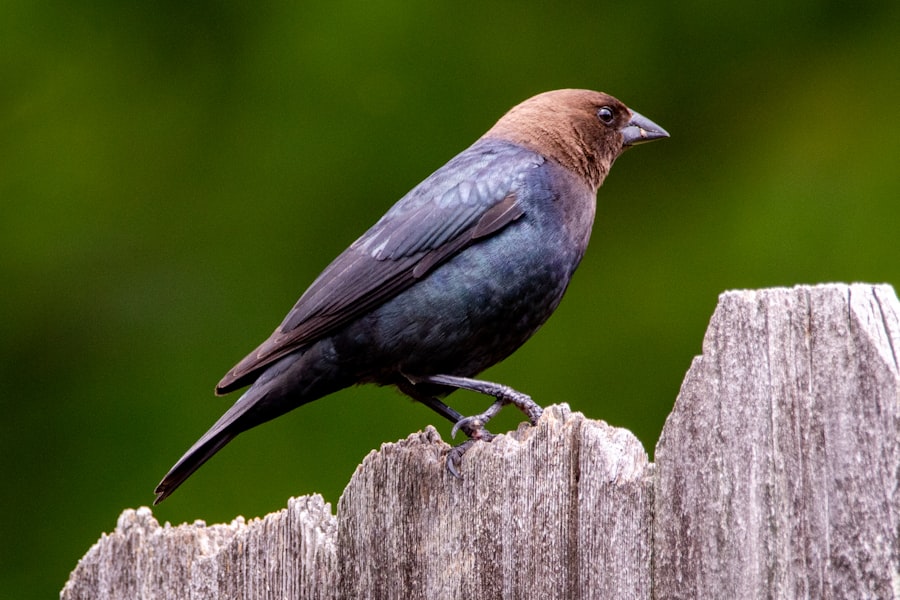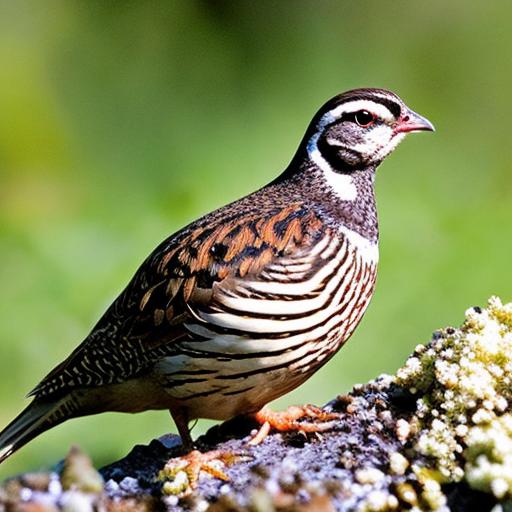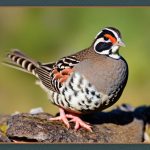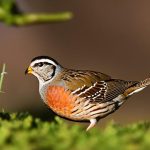When it comes to choosing the right breed of quail for your backyard, there are several factors to consider. First and foremost, you’ll want to think about the purpose of keeping quail. Are you looking to raise quail for their eggs, meat, or simply as pets? Different breeds of quail are better suited for different purposes. For example, if you’re interested in raising quail for their eggs, you might want to consider breeds like Coturnix (also known as Japanese) quail, which are known for their prolific egg-laying abilities. On the other hand, if you’re interested in raising quail for meat, you might want to consider breeds like the Jumbo Coturnix, which are larger and meatier than other quail breeds.
Another important factor to consider when choosing a breed of quail is the climate in your area. Some breeds of quail are better suited to cold climates, while others thrive in warmer environments. It’s important to choose a breed that is well-suited to the climate in your area to ensure the health and well-being of your quail. Additionally, consider the space you have available for your quail. Some breeds of quail require more space than others, so it’s important to choose a breed that is well-suited to the size of your backyard or coop. By considering these factors, you can choose the right breed of quail that will thrive in your backyard and meet your specific needs and goals.
Key Takeaways
- Consider the space available and your goals when choosing a breed of quail for your backyard
- Provide a safe and secure habitat for quail with proper flooring, ventilation, and protection from predators
- Offer a balanced diet of commercial quail feed, fresh water, and occasional treats like fruits and vegetables
- Monitor the health of your quail by observing their behavior, checking for signs of illness, and providing regular veterinary care
- Use an incubator or natural brooding methods to hatch quail eggs, and provide a warm and safe environment for the chicks
- Install fencing, netting, and motion-activated lights to protect quail from predators like cats, dogs, and birds of prey
- Enjoy fresh eggs, pest control, and the calming presence of quail in your backyard
Creating a Suitable Habitat for Quail
Once you’ve chosen the right breed of quail for your backyard, it’s important to create a suitable habitat for them to thrive. Quail require a safe and secure environment that provides them with shelter, protection from predators, and space to roam and forage. When it comes to housing for quail, there are several options to consider. You can choose to build a quail coop or aviary, or you can use pre-made cages or hutches. Regardless of the type of housing you choose, it’s important to ensure that it provides enough space for your quail to move around comfortably and engage in natural behaviors like dust bathing and foraging.
In addition to providing adequate housing, it’s important to create a suitable outdoor space for your quail. This can include a fenced-in area or outdoor run where your quail can safely roam and forage for food. It’s important to ensure that the outdoor space is secure and predator-proof to protect your quail from potential threats. Providing natural elements like grass, dirt, and plants in the outdoor space can also help create a more enriching environment for your quail. By creating a suitable habitat for your quail, you can ensure that they have everything they need to thrive and lead happy, healthy lives in your backyard.
Feeding and Nutrition for Backyard Quail
Feeding and nutrition are crucial aspects of caring for backyard quail. Providing a balanced and nutritious diet is essential for the health and well-being of your quail. When it comes to feeding quail, there are several options to consider. You can choose to feed commercial quail feed, which is specially formulated to meet the nutritional needs of quail. This type of feed typically contains a balanced mix of grains, protein, vitamins, and minerals to support the health of your quail.
In addition to commercial feed, you can also supplement your quail’s diet with fresh fruits and vegetables, as well as protein sources like mealworms or crickets. It’s important to provide access to clean, fresh water at all times to ensure that your quail stay hydrated. Additionally, providing access to grit or small stones can help aid in the digestion of food for your quail. It’s important to monitor your quail’s food intake and adjust their diet as needed based on their age, activity level, and overall health. By providing a balanced and nutritious diet, you can ensure that your backyard quail stay healthy and thrive in their environment.
Health and Wellness of Quail
Maintaining the health and wellness of your backyard quail is essential for their overall well-being. Regular health checks and observation are important for identifying any potential issues early on. It’s important to monitor your quail for signs of illness or injury, such as changes in behavior, decreased appetite, or abnormal droppings. If you notice any concerning symptoms, it’s important to consult with a veterinarian who has experience with poultry or avian species.
In addition to regular health checks, it’s important to provide a clean and sanitary environment for your quail. This includes regularly cleaning their housing and providing fresh bedding material. Good hygiene practices can help prevent the spread of disease and parasites among your quail flock. Additionally, providing opportunities for exercise and natural behaviors like dust bathing and foraging can help promote the overall wellness of your quail. By prioritizing the health and wellness of your backyard quail, you can ensure that they lead happy and healthy lives in your care.
Breeding and Incubating Quail Eggs
If you’re interested in breeding quail in your backyard, it’s important to understand the process of breeding and incubating quail eggs. Quail are prolific layers and can start laying eggs as early as 6-8 weeks old. When it comes to breeding quail, it’s important to provide a suitable environment that encourages natural mating behaviors. This can include providing adequate space, nesting boxes, and a balanced male-to-female ratio within your flock.
Once your quail have laid eggs, you may choose to collect the eggs for consumption or allow them to be incubated for hatching. If you decide to incubate quail eggs, it’s important to use a reliable incubator that maintains consistent temperature and humidity levels. The incubation period for quail eggs is approximately 17-18 days, after which the chicks will hatch. It’s important to closely monitor the incubation process and make any necessary adjustments to ensure a successful hatch.
After hatching, it’s important to provide proper care and nutrition for the newly hatched chicks. This includes providing a warm and safe environment, as well as access to starter feed and clean water. By understanding the process of breeding and incubating quail eggs, you can successfully raise new generations of quail in your backyard.
Predator Protection for Backyard Quail

Protecting your backyard quail from potential predators is essential for their safety and well-being. Common predators of quail can include raccoons, foxes, birds of prey, snakes, and domestic pets. It’s important to take proactive measures to secure their housing and outdoor space to prevent potential attacks from predators.
One effective way to protect your quail from predators is by using secure fencing around their outdoor space or coop. This can help prevent access from ground-dwelling predators like raccoons or foxes. Additionally, using hardware cloth or wire mesh with small openings can help prevent attacks from birds of prey or snakes.
In addition to securing their physical environment, it’s important to be mindful of potential threats from domestic pets like cats or dogs. It’s important to supervise interactions between pets and quail and provide secure housing that prevents access from potential predators.
By taking proactive measures to protect your backyard quail from predators, you can ensure that they stay safe and secure in their environment.
Benefits of Keeping Quail in Your Backyard
There are numerous benefits to keeping quail in your backyard. Quail are relatively low-maintenance compared to other poultry species like chickens or ducks, making them an ideal choice for beginner poultry keepers. They require less space and can be kept in smaller coops or aviaries, making them suitable for urban or suburban environments.
Quail are also prolific layers, with some breeds laying up to 300 eggs per year. Their small size makes them efficient egg producers without requiring as much feed or space as larger poultry species. Quail eggs are also highly nutritious and have gained popularity for their unique flavor and culinary uses.
In addition to their egg-laying abilities, quail are also valued for their meat production. Some breeds of quail are specifically bred for their meat, which is lean and flavorful.
Furthermore, keeping quail can be a rewarding experience for hobbyists or those interested in sustainable living. They are relatively quiet birds compared to chickens or ducks, making them suitable for urban environments where noise may be a concern.
Overall, keeping quail in your backyard can provide a sustainable source of eggs and meat while offering an enjoyable hobby that connects you with nature. Their small size and low-maintenance nature make them an ideal choice for backyard poultry keeping.
If you’re interested in keeping backyard quail, you’ll want to check out Poultry Wizard’s comprehensive guide on quail care at PoultryWizard.com. This article provides valuable insights into raising and caring for quail, covering topics such as housing, feeding, and general care. Whether you’re a beginner or an experienced quail keeper, this resource is a must-read for anyone looking to establish a thriving quail flock in their backyard.
FAQs
What are backyard quail?
Backyard quail are small game birds that are often kept for their eggs, meat, and for their charming presence in a backyard setting. They are relatively easy to care for and can be a great addition to a homestead or urban backyard.
What do backyard quail eat?
Backyard quail typically eat a diet of commercial quail feed, supplemented with fresh greens, grains, and occasional treats like mealworms or kitchen scraps. It’s important to provide them with a balanced diet to ensure their health and productivity.
How much space do backyard quail need?
Backyard quail don’t require a lot of space and can be kept in a relatively small area. A general rule of thumb is to provide at least 1 square foot of space per quail. They can also be kept in a quail hutch or coop, which can be easily built or purchased.
What are the benefits of keeping backyard quail?
Keeping backyard quail can provide a sustainable source of eggs and meat for a household. Additionally, their manure can be used as fertilizer for gardens, and their presence can help control pests in the backyard.
Are there any legal restrictions on keeping backyard quail?
Laws and regulations regarding keeping backyard quail vary by location, so it’s important to check with local authorities before starting a backyard quail operation. Some areas may have restrictions on the number of quail that can be kept, or may require permits for keeping them.
Meet Walter, the feathered-friend fanatic of Florida! Nestled in the sunshine state, Walter struts through life with his feathered companions, clucking his way to happiness. With a coop that’s fancier than a five-star hotel, he’s the Don Juan of the chicken world. When he’s not teaching his hens to do the cha-cha, you’ll find him in a heated debate with his prized rooster, Sir Clucks-a-Lot. Walter’s poultry passion is no yolk; he’s the sunny-side-up guy you never knew you needed in your flock of friends!







